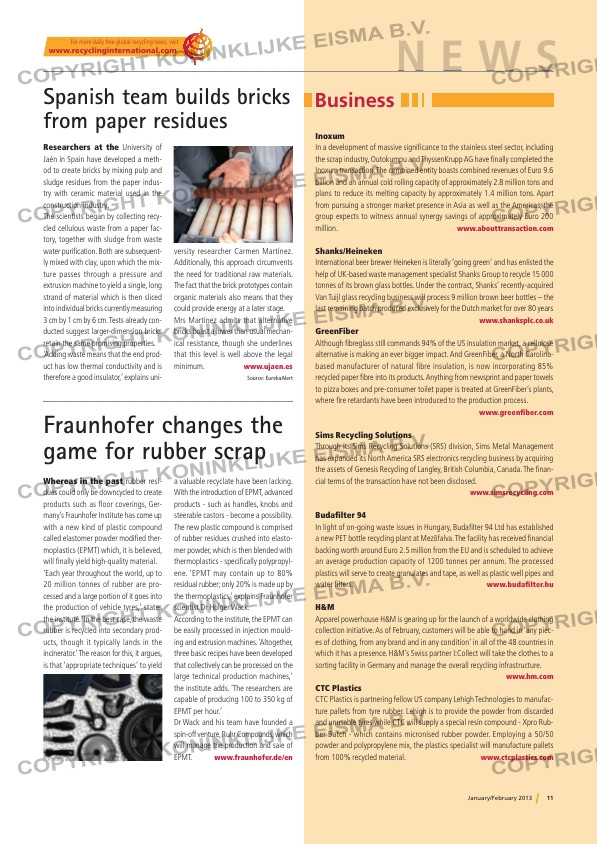Page 11 from: January / February 2013

Business
N E W S
11January/February 2013
For more daily free global recycling news, visit
www.recyclinginternational.com
Whereas in the past rubber resi-
dues could only be downcycled to create
products such as fl oor coverings, Ger-
many’s Fraunhofer Institute has come up
with a new kind of plastic compound
called elastomer powder modifi ed ther-
moplastics (EPMT) which, it is believed,
will fi nally yield high-quality material.
‘Each year throughout the world, up to
20 million tonnes of rubber are pro-
cessed and a large portion of it goes into
the production of vehicle tyres,’ states
the institute. ‘In the best case, the waste
rubber is recycled into secondary prod-
ucts, though it typically lands in the
incinerator.’ The reason for this, it argues,
is that ‘appropriate techniques’ to yield
a valuable recyclate have been lacking.
With the introduction of EPMT, advanced
products – such as handles, knobs and
steerable castors – become a possibility.
The new plastic compound is comprised
of rubber residues crushed into elasto-
mer powder, which is then blended with
thermoplastics – specifi cally polypropyl-
ene. ‘EPMT may contain up to 80%
residual rubber; only 20% is made up by
the thermoplastics,’ explains Fraunhofer
scientist Dr Holger Wack.
According to the institute, the EPMT can
be easily processed in injection mould-
ing and extrusion machines. ‘Altogether,
three basic recipes have been developed
that collectively can be processed on the
large technical production machines,’
the institute adds. ‘The researchers are
capable of producing 100 to 350 kg of
EPMT per hour.’
Dr Wack and his team have founded a
spin-off venture, Ruhr Compounds, which
will manage the production and sale of
EPMT. www.fraunhofer.de/en
Fraunhofer changes the
game for rubber scrap
Researchers at the University of
Jaén in Spain have developed a meth-
od to create bricks by mixing pulp and
sludge residues from the paper indus-
try with ceramic material used in the
construction industry.
The scientists began by collecting recy-
cled cellulous waste from a paper fac-
tory, together with sludge from waste
water purifi cation. Both are subsequent-
ly mixed with clay, upon which the mix-
ture passes through a pressure and
extrusion machine to yield a single, long
strand of material which is then sliced
into individual bricks currently measuring
3 cm by 1 cm by 6 cm. Tests already con-
ducted suggest larger-dimension bricks
retain the same promising properties.
‘Adding waste means that the end prod-
uct has low thermal conductivity and is
therefore a good insulator,’ explains uni-
versity researcher Carmen Martínez.
Additionally, this approach circumvents
the need for traditional raw materials.
The fact that the brick prototypes contain
organic materials also means that they
could provide energy at a later stage.
Mrs Martínez admits that alternative
bricks boast a lower than usual mechan-
ical resistance, though she underlines
that this level is well above the legal
minimum. www.ujaen.es
Source: EurekaAlert
Spanish team builds bricks
from paper residues
Inoxum
In a development of massive signifi cance to the stainless steel sector, including
the scrap industry, Outokumpu and ThyssenKrupp AG have fi nally completed the
Inoxum transaction. The combined entity boasts combined revenues of Euro 9.6
billion and an annual cold rolling capacity of approximately 2.8 million tons and
plans to reduce its melting capacity by approximately 1.4 million tons. Apart
from pursuing a stronger market presence in Asia as well as the Americas, the
group expects to witness annual synergy savings of approximately Euro 200
million. www.abouttransaction.com
Shanks/Heineken
International beer brewer Heineken is literally ‘going green’ and has enlisted the
help of UK-based waste management specialist Shanks Group to recycle 15 000
tonnes of its brown glass bottles. Under the contract, Shanks’ recently-acquired
Van Tuijl glass recycling business will process 9 million brown beer bottles – the
last remaining batch produced exclusively for the Dutch market for over 80 years
www.shanksplc.co.uk
GreenFiber
Although fi breglass still commands 94% of the US insulation market, a cellulose
alternative is making an ever bigger impact. And GreenFiber, a North Carolina-
based manufacturer of natural fi bre insulation, is now incorporating 85%
recycled paper fi bre into its products. Anything from newsprint and paper towels
to pizza boxes and pre-consumer toilet paper is treated at GreenFiber’s plants,
where fi re retardants have been introduced to the production process.
www.greenfi ber.com
Sims Recycling Solutions
Through its Sims Recycling Solutions (SRS) division, Sims Metal Management
has expanded its North America SRS electronics recycling business by acquiring
the assets of Genesis Recycling of Langley, British Columbia, Canada. The fi nan-
cial terms of the transaction have not been disclosed.
www.simsrecycling.com
Budafi lter 94
In light of on-going waste issues in Hungary, Budafi lter 94 Ltd has established
a new PET bottle recycling plant at Mezõfalva. The facility has received fi nancial
backing worth around Euro 2.5 million from the EU and is scheduled to achieve
an average production capacity of 1200 tonnes per annum. The processed
plastics will serve to create granulates and tape, as well as plastic well pipes and
water fi lters. www.budafi lter.hu
H&M
Apparel powerhouse H&M is gearing up for the launch of a worldwide clothing
collection initiative. As of February, customers will be able to hand in ‘any piec-
es of clothing, from any brand and in any condition’ in all of the 48 countries in
which it has a presence. H&M’s Swiss partner I:Collect will take the clothes to a
sorting facility in Germany and manage the overall recycling infrastructure.
www.hm.com
CTC Plastics
CTC Plastics is partnering fellow US company Lehigh Technologies to manufac-
ture pallets from tyre rubber. Lehigh is to provide the powder from discarded
and unusable tyres while CTC will supply a special resin compound – Xpro Rub-
ber Batch – which contains micronised rubber powder. Employing a 50/50
powder and polypropylene mix, the plastics specialist will manufacture pallets
from 100% recycled material. www.ctcplastics.com
RI_1-NEWS.indd 11 29-01-13 14:32



